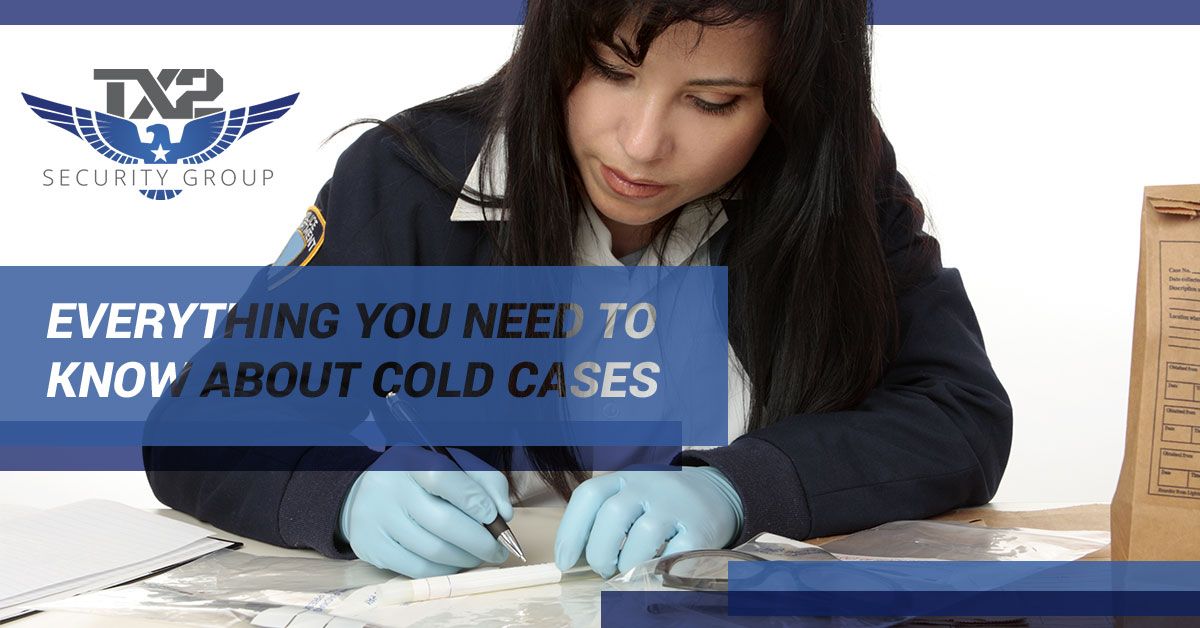How does a crime or accident go unsolved?
In most situations, a case becomes “cold” until a suspect is identified, charged and tried for the crime. Many times, a “person of interest” may be identified, but there is no concrete evidence that links the subject to the crime—unless the suspect comes forward with a confession (unlikely), the case will be considered cold until new evidence is presented that directly connects a possible suspect to the crime. The same goes for a case that goes to trial but does not result in conviction. The case may stay “open,” but will not be actively investigated until further evidence emerges.
How common are cold cases?
A study based on reports from the FBI’s Uniform Crime Reports outlines that almost 185,000 cases of homicide and non-negligent manslaughter went unsolved, between 1980 and 2008.. This study, called Project Cold Case, also revealed that in this same time period, there were 52,402 homicides in Texas, alone, and more than 15,000 of those cases went unsolved! All of this is to say, cold cases are extremely common, but few people actually hear about them because no official wants to say, “The case is now considered cold because we have exhausted all of our options and cannot convict a suspect, at this time.”
Why should I hire a private investigator to reopen my case?
Law enforcement officials have a lot going on, and rarely does a cold, unsolved case end up on their list of priorities. Many agencies are shorthanded, and the hardworking officers spread themselves thin trying to cover and handle all responsibilities within their department. It is unlikely that officials have the time and resources to reopen and investigate cold cases, especially if they are caught up in the middle of several active cases.
When you hire a private investigator to handle your cold case, your case will be the sole focus of our attention. Your case won’t be one on a long list of unsolved crimes that may or may not be reexamined in the future—we understand the sensitive nature of cases that are cold, and we will do every single thing in our power to discover new evidence that will help your case become active, once again. Your happiness and the safety of your loved one are our priorities, and we will always work our hardest to bring you the justice you deserve. Claim your free consultation today.
How can advances and improvements in forensics help my cold case?
According to the National Institute Of Justice, “Recent advances in DNA technology also are allowing officials to take a fresh look at these [cold] cases. Short tandem repeat analysis allows officials to test samples that, in the past, were too small to examine and to use statistics to confirm that a DNA profile belongs to one specific person. Using mitochondrial DNA, they can also test hairs… and unidentified remains that may accompany a cold case as evidence.”
Short tandem repeat (STR) is a forensic analysis that examines specific regions on nuclear DNA. While most of our DNA is identical to others, there are inherited regions of our DNA that vary from person to person. It is the sequences with the highest degree of variation that are used for DNA analysis in forensic cases. STRs are repeating copies of short, identical sequences that are arranged head-to-tail on the DNA strand. The chance that two individuals, with the exception of identical twins, will have the same DNA profile is one in one billion.
Mitochondrial DNA (mtDNA) has become an extremely valuable analysis for scientists to perform to discover the source of DNA that has been taken from a damaged or very small sample. Mitochondrial DNA has often played an important role in missing person investigations. Most human cells have hundreds of copies of the mtDNA genomes, which are located in the mitochondria, outside of the cell’s nucleus. Because there are hundreds of genomes to sample from, compared to the two copies of DNA inside the nucleus, there is a greater chance of recovering DNA from a damaged sample.
Cold Case Investigations In Texas
If you are tired of feeling like your case is being dismissed and feel there is a chance for your cold case to be solved, get in touch with the team of professionals at Tx2 Security Group. With more than 25 years of combined experience, our company’s founders have been able to amass a large group of security and law enforcement personnel to assist the private sector with their needs for security, investigations, consulting and training. Fill out a form online or give us a call to schedule your free consultation, today.


